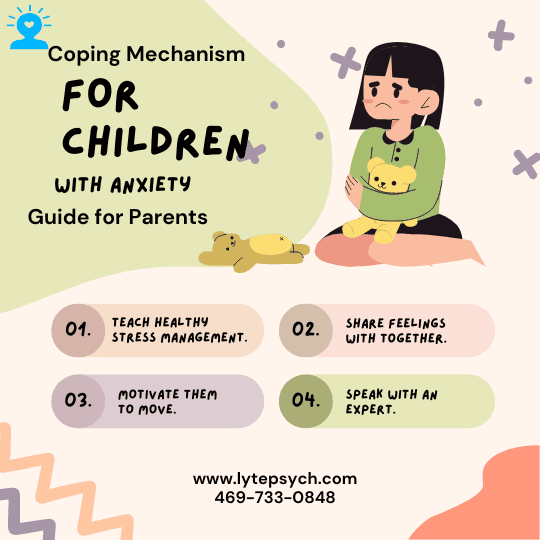Fri Apr 26 2024
Coping Mechanism for Children with Anxiety (Guide for Parents) From a Psychiatrist Perspective at Lyte Psychiatry (Best Adulst and Adolescents Psychiatrist and Therapist) Affordable Therapist and Psychiatrist Near You, Dallas, Dort Worth, TX

Coping Mechanism for Children with Anxiety (Guide for Parents) From a Psychiatrist Perspective at Lyte Psychiatry (Affordable Therapist & Psychiatrist Near You)
Childhood anxiety is a prevalent issue that significantly impacts children's emotional and psychological well-being. This section will introduce the topic by highlighting the importance of recognizing and addressing anxiety in children early, explaining its potential effects on their development, and setting the stage for the comprehensive insights provided by Lyte Psychiatry.
Understanding Anxiety in Children
Anxiety in children can often go unnoticed at first, as kids might not communicate their feelings clearly. Anxiety is more than just a little worry over a test or a particular event; it can be a persistent, overwhelming presence that affects their everyday functioning.
Recognizing the Signs of Anxiety in Your Children
Symptoms of anxiety in children can include:
Constant worries about future events or past actions
Changes in behavior, such as irritability or moodiness
Trouble sleeping or nightmares
Understanding these signs can help parents intervene early and seek appropriate help or begin to manage these symptoms at home.
Role of Parents in Managing Anxiety
Parents play a critical role in helping their children cope with anxiety. By providing a supportive environment and using appropriate strategies, parents can help their children manage their anxiety more effectively.
Creating a Supportive Environment
A supportive environment is crucial for a child dealing with anxiety. This includes:
Maintaining a routine to provide a sense of structure and security
Keeping open lines of communication so children feel safe expressing their worries
Ensuring the home feels like a safe space where the child can relax and not feel pressured
Effective Communication Strategies
Talking about anxiety can be difficult for children. Parents can help by:
Encouraging their child to express their feelings and worries
Offering reassurance and understanding
Avoiding overly critical or negative responses which may increase the child’s anxiety
Coping Mechanisms for Children
There are several effective strategies that parents can teach their children to help manage anxiety:
Deep Breathing Exercises: Teach your child how to take slow, deep breaths when they feel anxious.
Mindfulness: Simple mindfulness exercises can help children focus on the present moment and reduce anxiety.
Progressive Muscle Relaxation: This involves tensing and then relaxing different muscle groups which can reduce anxiety and stress.
Structured Problem-Solving: Help your child learn to identify what is causing their anxiety and think through solutions step-by-step.
When to Seek Professional Help
While home strategies are essential, some situations require professional intervention. If a child’s anxiety:
Persists over an extended period
Begins to interfere significantly with school, friendships, or daily activities
Includes severe symptoms such as panic attacks
It might be time to consult a mental health professional who can offer therapy or counseling that is suited to your child's needs.
The Importance of Professional Guidance
A mental health professional can offer:
Detailed assessments to understand the anxiety’s root causes
Guidance on suitable treatment options like Cognitive Behavioral Therapy (CBT) or medication
Support for parents on how to manage their child's anxiety
The Benefits of Consulting a Psychiatrist
Here, the focus would be on how a psychiatrist can aid in the management of childhood anxiety through comprehensive assessments, personalized treatment plans, and possibly medication, explaining how professional interventions differ from general guidance and the unique benefits they offer.
Seeking Professional Help and Diagnosis for Your Children at Lyte Psychiatry (Affordable Therapist and Psychiatrist Near You)
Supporting a child with anxiety is a continuous process that requires patience, empathy, and proactive engagement. With the right tools and professional support from Lyte Psychiatry, parents can play a pivotal role in helping their childrenget around the challenges of anxiety, leading to healthier and more resilient futures.
To schedule an appointment. Click Here
To See our services. Click Here
Call us if you haves questions at 469-733-0848
FAQs
Q: What are the first steps to take if I suspect my child has anxiety?
A: Begin by observing their behavior and talking to them about their feelings. If symptoms persist, consider consulting a mental health professional.
Q: Can anxiety in children be completely cured?
A: Anxiety can typically be managed effectively with the right therapeutic approaches and ongoing support, although some individuals may experience periods of anxiety throughout their lives.
Q: What should I look for in a psychiatrist for my child?
A: Seek a psychiatrist who specializes in pediatric mental health, is empathetic, and adopts an individualized approach to treatment.